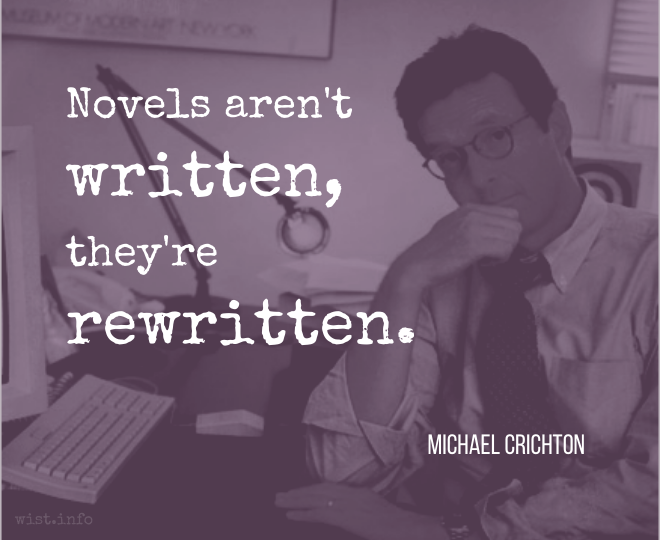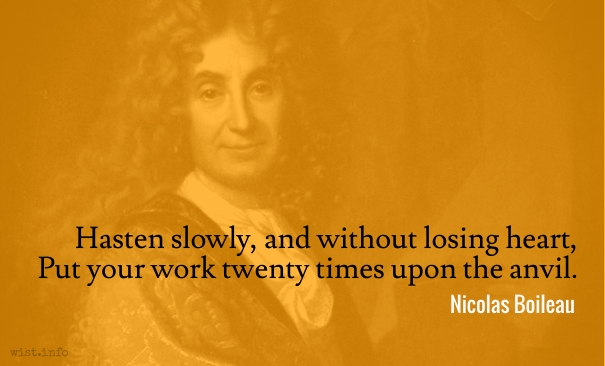A book is never finished, it is abandoned.
Gene Fowler (1890-1960) American journalist, author, and dramatist. [b. Eugene Devlan]
Quoted in H. Allen Smith, The Life and Legend of Gene Fowler, ch. 27 (1977)
(Source)
Quotations about:
revision
Note not all quotations have been tagged, so Search may find additional quotes on this topic.
It is never too late — in fiction or in life — to revise.
To be a writer is to accept failure as a profession — which of us is Dante or Shakespeare? — and could they return, wouldn’t they fall at once to revising, knowing they could make the work better? In our own dwarfed way, we are trying for something like perfection, knowing it is unachievable (except of course that trying and failing is a better way of living than not trying).
John Ciardi (1916-1986) American poet, writer, critic
In Vince Clemente, “‘A Man Is What He Does With His Attention’: A Conversation with John Ciardi,” Poesis, Vol. 7 #2 (1986)
(Source)
The illiterate of the 21st century will not be those that cannot read or write, but those who cannot learn, unlearn, and relearn.
Alvin Toffler (1928-2016) American writer and futurist
(Paraphrase)
(Source)
Sometimes given as "The illiterate of the future ..." This ubiquitous (mis)quotation of Toffler is a conflation of two sentences in ch. 18 of Toffler's Future Shock (1970).
- On p. 414, Toffler writes, "By instructing students how to learn, unlearn and relearn, a powerful new dimension can be added to education."
- In the next paragraph, he quotes psychologist Herbert Gerjuoy: "Tomorrow's illiterate will not be the man who can't read; he will be the man who has not learned how to learn."
Novels aren’t written, they’re rewritten. It is one of the hardest things to accept, especially after the seventh rewrite hasn’t quite done it.
Michael Crichton (1942-2008) American author, producer, director, and screenwriter
(Attributed)
Crichton was quoted a number of times on the adage, which he in turn claimed was in more general use. However, he seems to have been key in popularizing it. See here for more discussion and specific citations.
Hasten slowly, and without losing heart,
Put your work twenty times upon the anvil.[Hâtez-vous lentement ; et, sans perdre courage,
Vingt fois sur le métier remettez votre ouvrage.]
I have only made this [letter] longer, because I have not had the time to make it shorter.
[Je n’ai fait celle-ci plus longue que parce que je n’ai pas eu le loisir de la faire plus courte.]
Blaise Pascal (1623-1662) French scientist and philosopher
Lettres provinciales, #16 (1657)
Alt. trans.: "The present letter is a very long one, simply because I had no leisure to make it shorter." Sometimes attributed to Ben Franklin or Mark Twain. For more information see here.
In the eyes of those lovers of perfection, a work is never finished — a word that for them has no sense — but abandoned; and this abandonment, whether to the flames or to the public (and which is the result of weariness or an obligation to deliver) is a kind of an accident to them, like the breaking off of a reflection, which fatigue, irritation, or something similar has made worthless.
[Aux yeux de ces amateurs d’inquiétude et de perfection, un ouvrage n’est jamais achevé, – mot qui pour eux n’a aucun sens, – mais abandonné ; et cet abandon, qui le livre aux flammes ou au public (et qu’il soit l’effet de la lassitude ou de l’obligation de livrer) est une sorte d’accident, comparable à la rupture d’une réflexion, que la fatigue, le fâcheux ou quelque sensation viennent rendre nulle.]
Paul Valéry (1871-1945) French poet, critic, author, polymath
“Au sujet du ‘Cimetière marin,'” La Nouvelle Revue Française (Mar 1933)
(Source)
Often rendered as: "A poem is never finished, only abandoned."
Alt. trans.: "In the eyes of those who anxiously seek perfection, a work is never truly completed -- a word that for them has no sense -- but abandoned; and this abandonment, of the book to the fire or to the public, whether due to weariness or to a need to deliver it for publication, is a sort of accident, comparable to the letting-go of an idea that has become so tiring or annoying that one has lost all interest in it." [tr. Maggio]
In the same vein, in "Recollections," Valery wrote: "A work is never completed except by some accident such as weariness, satisfaction, the need to deliver, or death: for, in relation to who or what is making it, it can only be one stage in a series of inner transformations."
Also attributed to W. H. Auden, Oscar Wilde, and Jean Cocteau, For more discussion of the origin of this phrase, see here.











